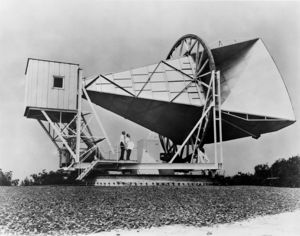Category:Radio astronomy: Difference between revisions
From ETHW
No edit summary |
No edit summary |
||
| (2 intermediate revisions by 2 users not shown) | |||
| Line 1: | Line 1: | ||
[[Image:Horn Antenna-in Holmdel, New Jersey.jpeg|thumb|right|The 15 meter Holmdel horn antenna at Bell Telephone Laboratories in Holmdel, New Jersey was built in 1959 for pioneering work in communication satellites for the NASA ECHO I. In 1964, radio astronomers Robert Wilson and Arno Penzias discovered the cosmic microwave background radiation with it, for which they were awarded the 1978 Nobel prize in physics.]] | |||
The field of astronomy which explores space by using radio frequencies and waves | The field of astronomy which explores space by using radio frequencies and waves | ||
| Line 5: | Line 7: | ||
== Subcategories == | == Subcategories == | ||
*'''[[:Category:Very long baseline interferometry|Very long baseline interferometry]]''' - or VLBI, a type of atronomical interferometry that allows observations made by many telescopes to be combined | |||
*'''[[:Category:Very long baseline interferometry|Very long baseline interferometry]]''' | |||
[[Category:Fields,_waves_&_electromagnetics|{{PAGENAME}}]] | [[Category:Fields,_waves_&_electromagnetics|{{PAGENAME}}]] | ||
Revision as of 19:39, 14 April 2014

The 15 meter Holmdel horn antenna at Bell Telephone Laboratories in Holmdel, New Jersey was built in 1959 for pioneering work in communication satellites for the NASA ECHO I. In 1964, radio astronomers Robert Wilson and Arno Penzias discovered the cosmic microwave background radiation with it, for which they were awarded the 1978 Nobel prize in physics.
The field of astronomy which explores space by using radio frequencies and waves
See the article Beginnings of radio astronomy for a history of radio astronomy's origins
Subcategories
- Very long baseline interferometry - or VLBI, a type of atronomical interferometry that allows observations made by many telescopes to be combined
Pages in category "Radio astronomy"
The following 20 pages are in this category, out of 20 total.